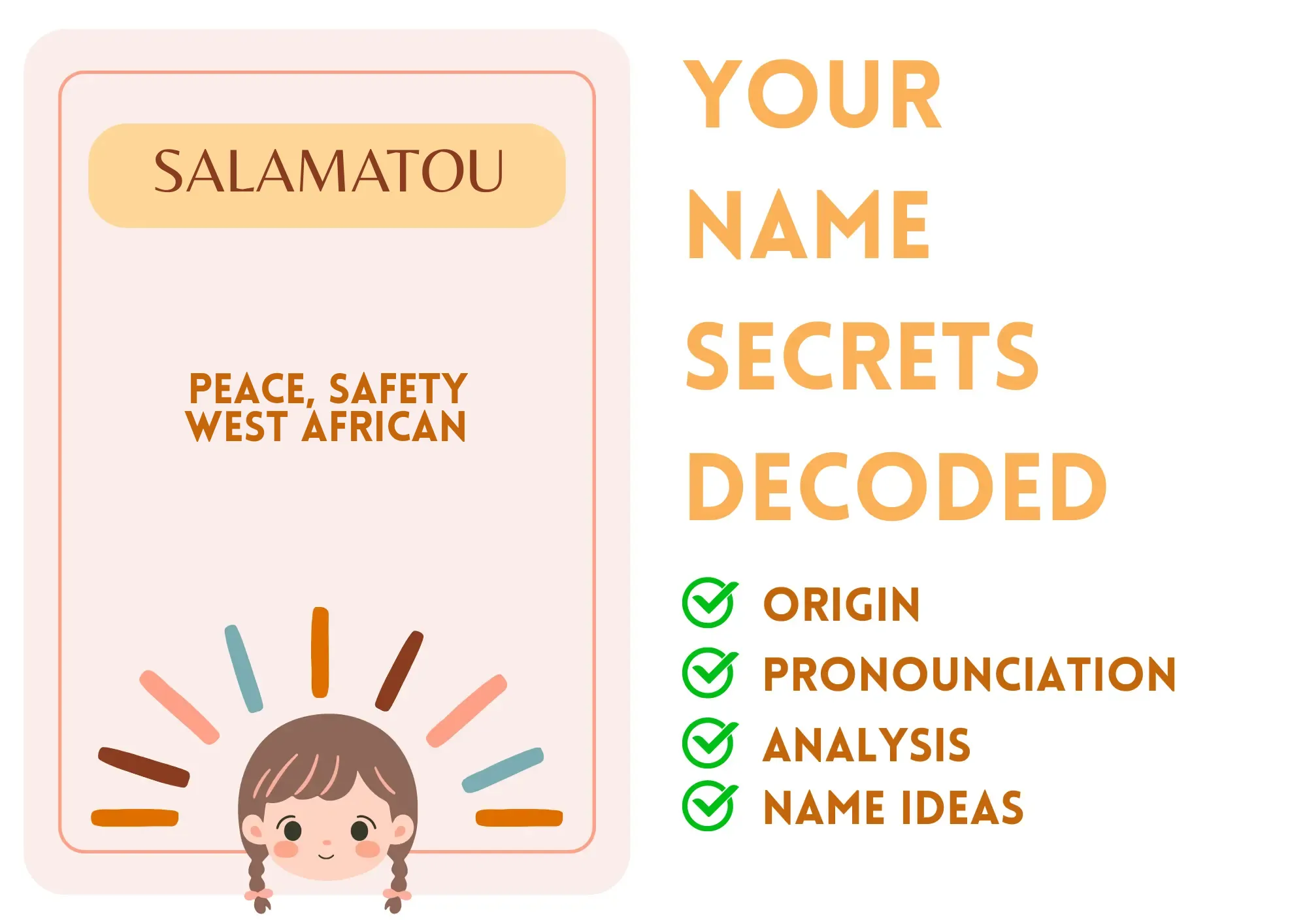
Salamatou
Salamatou is a distinctive and culturally rich name originating from the West African culture, specifically associated with the Fulani and other ethnolinguistic groups. The name generally translates to 'peace' or 'safety,' embodying a sentiment of tranquility and protection. It is significant in honoring values of harmony and security within the community. Although typically given to girls, it may also be considered for boys.
The name is celebrated for its melodic sound and deep meaning, often chosen for its positive connotations linked with peace and well-being. Salamatou is easy to write and pronounce, making it approachable and memorable.
In popular culture, while Salamatou does not appear widely in mainstream media, names originating from similar cultural backgrounds do find representation in literature and storytelling, often symbolizing strength and resilience. Overall, it is a cherished name among those who value cultural heritage and meaningful naming.
Basic Information
Gender: Girl
Sounds Like: sah-lah-mah-too
Pronunciation Explanation: Pronounced with equal emphasis on each syllable: 'sah', 'lah', 'mah', 'too'.
Summary and Meaning
Meaning: peace, safety (West African)
Origin: The name Salamatou has roots in West African cultures, notably the Fulani ethnicity where traditional and meaningful names are prevalent.
Usage: Salamatou is traditionally a feminine name, although it can also be adopted as a unisex name.
Name Number (Chaldean)
Name Number (Pythagorean)
Popularity (Global Rank)
Overall: 70542
Girls: 77177
Most Popular in
Religious and Cultural Significance
Religion: Islam
Background: In many West African cultures, Salamatou is often embraced by Muslim communities, emphasizing peace as a vital aspect of Islamic teachings.
Cultural Significance: Salamatou embodies the cultural emphasis on peace and protection, and is celebrated in various social and familial gatherings within these communities.
Historical Significance: Historically, names like Salamatou carry the weight of cultural identity and familial honor among the Fulani and other West African peoples, often reflecting positive attributes desired for children.
Popular Culture
Literature and Mythology: While Salamatou itself may not be a widely recognized character in literature, names with similar themes of peace and resilience appear in various folk tales and stories in West African narratives.
Movies and Television: Although not common in the cinematic world, characters from Fulani culture often exhibit virtues associated with names like Salamatou, focusing on strength and peace.
Feelings and Perceptions
Perception: Salamatou is viewed positively as a name signifying tranquility and protection. Its soft and rhythmic nature elicits feelings of calmness and serenity.
Positive Feelings: Unique, peaceful, elegant, reassuring, culturally rich.
Negative Feelings: Some might find it unfamiliar or difficult to pronounce initially due to its less common usage outside of specific cultures.
Practical Considerations
Ease of Writing and Calling: Salamatou is relatively easy to write and pronounce, consisting of four syllables. Its unique structure makes it memorable, though it may require some effort for those unfamiliar with similar names.
Common Typos and Misspellings: Salamatouh,Salamatouo,Salmetou,Salmatu
Common Nicknames: Sally,Lama,Mato
Salamatou Popularity
Salamatou Usage and Popularity By Country
| Country | Rank (Overall) |
|---|---|
| Chad | 1060 |
| Niger | 1122 |
| Cameroon | 1735 |
| Mali | 2045 |
| Senegal | 2451 |
| Gabon | 2711 |
| Benin | 4287 |
| Haiti | 7504 |
| Morocco | 12250 |
| Belgium | 15521 |
Salamatou Usage and Popularity By City
| City | Rank (Overall) |
|---|---|
| Paris | 14866 |
| Conway | 745 |
| Niamey | 75 |
| Brussels | 11318 |
Compatibility Analysis
Famous Persons Named Salamatou
Related Names
Similar Sounding Names:
Salama,Tamatu,Salamatu,Salam